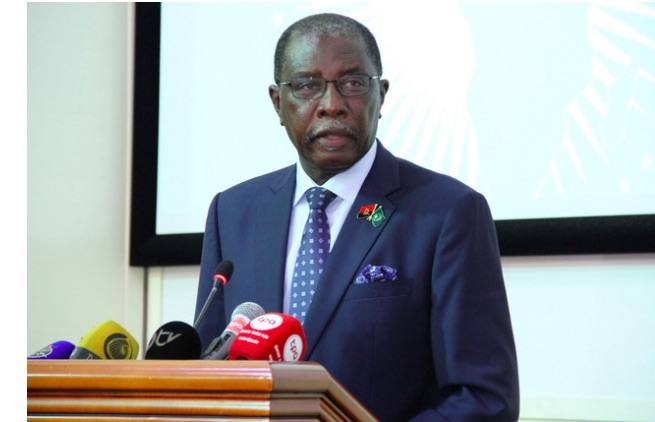. . DEMOCRATIC PARTICIPATION . .
A press release from EIN News Desk
The Minister of State and Chief of the Security Affairs of the President of Republic Pedro Sebastiãon Thursday [December 6] encouraged the African Union (AU), in particular its Peace and Security Council, to keep close coordination with the economic communities and regional mechanisms for the prevention, management and peaceful resolution to conflicts on the continent.,

[In Luanda, Angola}, Pedro Sebastião was speaking at the opening ceremony of the ministerial meeting of the Peace and Security Council (PSC) of the African Union (AU), on behalf of Angolan Head of State, João Lourenço.
He said that such coordination with regional mechanisms should promote national reconciliation and draw lessons from past and present processes.
It should also facilitate the exchange of experiences within the framework of the African peace and security architecture for the “silence of weapons by 2020”.
In view of the conflicts to continue topping the international agenda, the president’s aide defended combined efforts between the AU and the UN Security Council, as a privileged international body for the maintenance of international peace and security in order to gather resources for true solidarity between countries in response to the phenomena that still cause instability on the continent.
Among the conflicts that cause instability on the continent, he highlighted the problem of terrorism in the Sahel, Great Lakes and Horn of Africa regions.
He recalled that it was precisely in the spirit of solidarity with the “brother peoples of the Great Lakes region” that Angola was invited to contribute to the mediation process, with a view to resolving the disagreement between Rwanda and Uganda.
(Continued in the right column)
Can the African Union help bring a culture of peace to Africa?
(Continued from the left column)
Angola’s effort to bring together these two brother countries resulted in the signing of the Luanda Memorandum of Understanding.
Pedro Sebastião stressed in his speech that the culmination of the armed conflict in Angola, after three decades, is a living example that political will is the crucial element in achieving peace.
In the specific case of Angola, he noted that inclusive dialogue played a decisive role in achieving lasting peace “which we carefully take care of for the maintenance of this acquired good with blood, sweat and tears.”
“Today we can assume that the culture of peace is a fact of life in our country,” said the Angolan leader, noting that the country is available to share its experience regarding peace and conflict management and help the countries of the continent in this matter.
The official noted, however, that Angolans are aware that peace in the country has also benefited from the valuable contribution of the African Union and its member states, where some of their children have paid with their life, highlighting the case of Maitre Aione Blondi Beye.
According to the head of the President’s Security Affairs, political stability and democracy can only be achieved through the creation of strong institutions and the adoption of behaviours that ensure the peaceful resolution to conflicts inherent in human societies.
To him, democratic processes and inclusive systems of governance ensure the development of a national environment of stability, fostering the creation of a culture of peace.
The most worrying cases for Angolan diplomacy and the AU’s PSC are those of the eastern Democratic Republic of Congo (DRC) and the tension in the Great Lakes region (involving Rwanda, Burundi and Uganda).
The official also referred to the latent conflicts in South Sudan and the Central African Republic (CAR), as example, where Angola is directly engaged in finding a solution.
The PSC meeting is part of the peace-building strategy and the promotion of sustainable development.
The opening session of the meeting of the body gathered 80 entities, including 15 foreign ministers from the African Union (AU) PSC states.
Angola took over the presidency of the Peace and Security Council of the African Union on December 1.
,